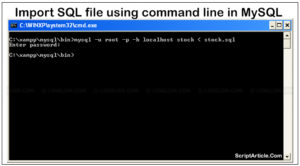Tip #1
<?php
$todayTimestamp = time();
/* Don’t Use.*/
$nextDay = $todayTimestamp + 86400;
/* Do instead.*/
$nextDay = strtotime(‘+1 day’, $todayTimestamp);
?>
The first one will not work exactly if you move into or out of daylight savings time.
An extra problem is that the second example is more readable, specially if you add like 2 weeks and 2 days (‘+2 weeks 2 days’)
Use date_default_timezone_set() function before, if you doing calculation to a specific region.
Tip #2
Don’t use regexp to filter/match an email or an URL.There are already built-in filters in PHP for that.
<?php
$email = filter_var(‘scriptarticle@gmail.com’, FILTER_VALIDATE_EMAIL);
?>
See documentation on filter_var()
Tip #3
echo gives you more than one string as parameter.
Using some parameters is going to more faster than blending some variables into a parameter.
<?php
$a = ‘Hello’;
$b = ‘Scriptarticle’;
echo ‘Say ‘ .$a. ‘ to ‘ .$b;
//Below will faster
echo ‘Say ‘, $a ,’ to ‘, $b;
?>
Tip #4
Use isset() instead of strlen() function
<?php
$str = “434e5”;
if (!isset($str{5})) {
echo ‘String must be at least 5 chars<br />’;
}
if (strlen($str) < 5){
echo ‘String must be at least 5 chars’;
}
?>
isset() needs little more time than strlen() because isset() is a language construct.
When you treat strings as arrays, each character in the string is an element in the array. By determining whether a particular element exists, you can determine whether the string is at least that many characters long. (Note that the first character is element 0, so $str[5] is the sixth character in $str)
Tip #5
Avoid the use of printf function
Unlike print and echo, printf() is a function with associated function execution overhead. More over printf() is designed to support various formatting schemes. To handle formatting printf() needs to scan the specified string for special formatting code that are to be replaced with variables.
<?php
echo ‘Result:’, $result;
// is better than
printf( “Result.%s”, $result );
?>
Tip #6
Avoid large string concatenation
When do concatenation string, avoid uniting with large size string. It can obstruct code execution that can display faster.
<?php
//Large string concatenation
$title = ‘this is’;
$body = ‘..a very large blog..’;
echo “Subject.$title\n\n$body”;
//Avoid large string concatenation
$title = ‘this is’;
$body = ‘..a very large blog..’;
echo “Subject.$title\n\n”;
echo $body;
?>
Tip #7
Use boolean data type
PHP is allowing writing Boolean data type with uppercase or lowercase.
But, writing with lowercase is faster than uppercase. When found a constant, PHP do lookup hash constant name.
<?php
if ($var = TRUE) {
…
}
//this is more faster
if ($var = true) {
…
}
?>
Boolean value 1 and 0 are faster than true and false.
Tip #8
Avoid space in your code
The main purpose of code optimization is to get faster code execution, because PHP codes going to execute every time they are requested.
Avoid the use of many spaces ( ) is a good thing. Every space is 1 byte and every tab (\t) is 1 byte. When you’re using four spaces, you’ve been use 4 bytes. It will more effective if you’re using a tab (\t).
Tip #9
Print Output
PHP is giving some sting functions to printing output into browser and we are often using print() and echo() function.
Print() function behavior like the other function in common and having return value integer 1. Thus, print() can used as part of expression which more complex. Meanwhile, echo() is able to accept more than one parameters all at once, and does not having return value.
<?php
print() ‘string 1’;
echo ‘string 1’;
// using some parameters
echo ‘string 1’, “string 2”, ‘…’;
?>
echo() function string will execution more faster than print(). This differentiate caused by will return status (integer) which expose what process has done or not.
Tip #10
File Access Optimization
When you need to include a file, recheck file content that will be use. If file not contains PHP codes, use readfile() function to increase performance.
Because files that including with readfile() does not parsing by PHP. It will be different with construction language include() and require(), and files will be evaluated before.
Other side is, readfile() increases attack risk. This risk will be happen when accessing file from URL.
Solution for the attack risk is by using File Handling.
Tip #11
Use ternary operators instead of if, else
Ternary operators can be very helpful and clean up the code, but don’t over complicate them otherwise your code might become inundated with large amounts of complex ridiculousness.
<?php
$name = (!empty($_GET[‘name’])? $_GET[‘name’] .’Scriptarticle’);
?>
Tip #12
Class Auto loading
If you have a very large number of classes that could potentially use within one or many sections of your code, you could include all of them within a common header file, or only include the ones that you know that you’re going to use on that page. However, you then need to remember to include new classes whenever we want to use a different one etc.
Use PHP function spl_autoload_register() instead of that.
You can use the below function where you will need to pass the name of the class that you’re trying to load as the first parameter of the function. As of PHP 5.3.0 we are able to use anonymous functions, basically a function thas has no name.
<?php
spl_autoload_register(function ($class){
echo ‘We are loading class.’ . $class;
include_once(‘classes/’ . $class . ‘.inc.php’);
echo ‘Class loaded.’;
});
?>
In PHP5, there ia a magic function called as __autoload() for fulfilling the same purpose.
Tip #13
Referencing
Passing variables by reference is a way to pass variables into functions so that the function can alter the original variable without having to return anything or define it as global etc. A function parameter that is going to be passed in as a reference is proceeded by an ampersand (&). Let’s see the below example.
<?php
function lowercase(&$string){
$string = strtolower($string);
}
$name = ‘STEPHEN’;
lowercase($name);
echo $name; // returns stephen
?>
There are so many advantages of using references, for example you don’t have to return anything from the function, nor do you have to look to define them as globally accessible.
References are very useful when you use them with arrays. Let’s say we have a function that sets the first item in any array to flower.
<?php
function flowerArray(&$array){
$array[0] = ‘flower’;
}
$nonflower = array(‘mahesh’, ‘nirmal’, ‘saurabh’);
flowerArray($nonflower);
print_r($nonflower); // This will now have changed ‘mahesh’ to ‘flower’
?>
Tip #14
Single Quotes vs. Double Quotes
You may or may not think about this point in your PHP use but it is kind of a big deal. Using the right or wrong quotes can not only cause errors that might be hard to find but there can be a slight performance boost and can make your code much easier to read.
<?php
echo ‘hello scriptarticle’;
?>
<?php
echo “hello scriptarticle”;
?>
These will produce the exact same end result but do you know which one is technically better? The single quote. The single quote just puts exactly what is inside of it without processing while the double quote actually evaluates and processes. Let’s take an example.
<?php
$example = ‘hello scriptarticle’;
echo ‘$example’; // outcome will be $example
echo “$example”; // outcome will be hello scriptarticle
?>
As you can see here the double quotes take the time to process what is inside so technically there will be a little more overhead.
Obviously on a small scale this means nothing but if you have a loop that iterates 1000 or more times you might start to see the benefits of single quotes in a performance sense.
Tip #15
PHP Short Tags
You know when you just want to pre populate a form or add one PHP variable into the middle of an HTML block. Which one is more readable and easy to use PHP open tags or short tags?
<?php echo $name; ?>
<?=$name ?>
Lower one will produce the exact same output as the first but much neater and with a little less code. It’s it?
NOTE: A short tag is something that can be disabled in the php.ini so it is not guaranteed to work but industry standard has short tags enabled.
Tip #16
Working with zero filled numbers in PHP
Padding Zero is very easy to do by using PHP build-in functions.
<?php echo $new_number = str_pad($num, 3, “0”, STR_PAD_LEFT); ?>
Remove padding zero
<?php echo intval($new_number); ?>
Tip #17
Know the Difference between Comparison Operators
<?php
$sentence = ‘scriptarticle is very good blog’;
if (strpos($sentence, ‘scriptarticle’)) {
echo ‘I like scriptarticle.’;
} else {
echo ‘I don\’t like scriptarticle..’;
}
?>
Because the substring “scriptarticle” occurs at the very beginning of “scriptarticle is very good blog”, strpos() correctly returns 0, indicating the first position in the string. Because the conditional statement treats this as a Boolean, it evaluates to FALSE, and the condition fails. In other words, it looks like ‘scriptarticle’ is not in the sentence but it is!
This can be corrected with a strict comparison as below.
<?php
if (strpos($sentence, ‘scriptarticle’) !== FALSE) {
echo ‘I like scriptarticle.’;
} else {
echo ‘I don\’t like scriptarticle..’;
}
?>
Tip #18
Methods in derived classes run faster than ones defined in the base class.
Tip #19
Accessing arrays
e.g. $row[‘id’] is 7 times faster than $row[id]
Tip #20
Avoid functions inside loops
Try to use functions outside loops. Otherwise the function may get called each time and obeviously it will affect performance.
<?php
/* loop with a count() inside the control block will be
executed on EVERY loop iteration.
*/
$max = count( $array );
for( $i = 0; $i < $max; $i++ )
{
// do something here
}
// is better than
for( $i = 0; $i < count( $array ); $i++ )
{
// do something here
}
?>
It’s even faster if you eliminate the call to count() AND the explicit use of the counter by using a foreach loop in place of the for loop.
<?php
foreach ($array as $i) {
// do something
}
?>
Tip #21
When you need to output a large or even a medium sized static bit of text it is faster and simpler to put it outside the PHP.
This will make the PHP parser effectively skip over this bit of text and output it as is without any overhead. You should be careful however and not use this for many small strings in between PHP code as multiple context switches between PHP and plain text will be away at the performance gained by not having PHP print the text via one of its functions or constructs.
Tip #22
true is faster than TRUE
This is because when looking for constants PHP does a hash lookup for name as is & since names are always stored lowercased, by using them you avoid 2 hash lookups. Furthermore, by using 1 and 0 instead of TRUE and FALSE, can be considerably faster.
Tip #23
Incrementing or decrementing the value of the variable
When incrementing or decrementing the value of the variable $i++ happens to be a slower then ++$i.++$i happens to be faster in PHP because instead of 4 opcodes used for $i++ you only need 3. Post incrementation actually causes in the creation of a temporary var that is then incremented. While pre-incrementation increases the original value directly. This is one of the optimization that opcode optimized like Zends PHP optimizer.
It is a still a good idea to keep in mind since not all opcode optimizers perform this optimization and there are plenty of ISPs and servers running without an opcode optimizer.
Additionally,
* Incrementing a local variable in a method is the fastest. Nearly the same as calling a local variable in a function.
* Incrementing a global variable is 2 times slower than a local variable.
* Incrementing an object property (eg. $this->prop++) is 3 times slower than a local variable.
* Incrementing an undefined local variable is 9-10 times slower than a pre-initialized one.
Tip #24
Free unnecessary memory
Unset your variables to free memory, especially large arrays.
Tip #25
Specify full paths
Use full paths in includes and requires, less time spent on resolving the OS paths.
<?php
include( ‘/var/www/html/your_app/database.php’ );
//is better than
include( ‘database.php’ );
?>
Tip #26
Use get_browser() built-in function to get browser information
Easily get your hands on the user’s browser-type.Some programmers leave this process to the browser end but can be useful to get this info server side.
Tip #27
debug_print_backtrace()
This print a debug-style list of what was called to get the point where this function is called.
Tip #28
Automatic optimization for your database
You will probably add and delete tables from time to time. Therefore, you should use a solution that works no matter how your database looks like. For this, you can use this PHP script that finds all your tables, and then perform Optimize on every single one.
<?php
dbConnect();
$tables = mysql_query(“SHOW TABLES”);
while ($table = mysql_fetch_assoc($tables))
{
foreach ($table as $db => $tablename)
{
mysql_query(“OPTIMIZE TABLE ‘”.$tablename.”‘”)
or die(mysql_error());
}
}
?>
Tip #29
require() vs. require_once()
Use require() instead of require_once() where possible.
Tip #30
Secure HTTP connections
You can force a secure HTTP connection using the following code,
<?php
if (!($HTTPS == “on”)) {
header (“Location.https://$SERVER_NAME$php_SELF”);
exit;
}
?>




Tip #4 : this substring technique is ZERO based so use {4}
if ( !isset($str{4}) )
Tip #7 : you want to use == or ===
if ($var == true) {